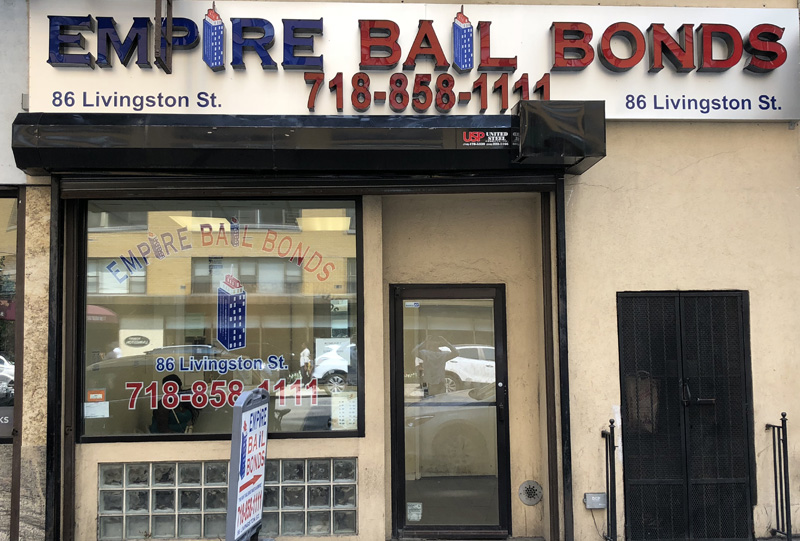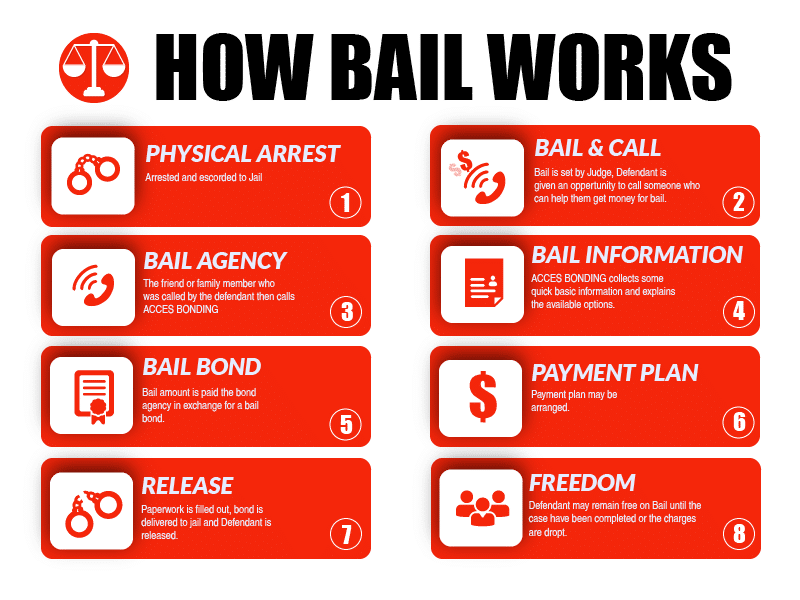Unlocking the Secrets of Bail Bonds: A Thorough Overview
Navigating the detailed world of Bail bonds can typically feel like figuring out a puzzling code, with layers of intricacy that remain concealed to many. From the different types of Bail bonds available to the crucial function of a co-signer, each element plays a crucial component in this legal procedure.
Comprehending Bail Bonds Process
When encountering a lawful circumstance that requires publishing Bail, understanding the Bail bonds procedure is vital to navigate the intricacies of the judicial system successfully. Bail bonds serve as a financial warranty to the court that the accused will show up for all needed court appearances. This procedure includes a bail bondsman, who typically bills a non-refundable charge, usually around 10% of the overall Bail amount, to post the Bail in behalf of the accused.

In addition, security, such as home or possessions, might be needed to safeguard the bail bond. Recognizing the terms of the bail bond contract is vital to make sure compliance and prevent any kind of added legal effects. By comprehending the Bail bonds process, individuals can make informed choices when browsing the legal system.
Sorts Of Bail Bonds Available
The most typical kind is a guaranty bond, where a bail bondsman pays the complete Bail quantity on part of the offender in exchange for a non-refundable cost, usually around 10% of the complete Bail. Cash bonds require the full Bail amount to be paid in money before the accused can be launched.
In addition, there are government Bail bonds for instances entailing federal fees and migration bonds for people apprehended by Migration and Customs Enforcement (ICE) Recognizance, or signature bonds, are provided based upon the offender's assurance to show up in court without needing any settlement. Finally, transfer bonds are used when an offender is apprehended in a different state and requires to publish Bail to be released. Comprehending the different types of Bail bonds readily available can assist accuseds navigate the lawful procedure a lot more properly.
Duties of the Co-Signer

In addition, as a co-signer, you are responsible for guaranteeing that the offender follows any type of problems set by the court, such as going to therapy or avoiding particular tasks. It is necessary to keep open interaction with the accused to check their conformity and deal with any type of concerns promptly. Inevitably, being a co-signer entails a considerable degree of trust fund and responsibility, as you are financially and legitimately tied to the defendant's Bail responsibilities.
Effects of Missing Bail

Missing Bail can have significant lawful repercussions for both the co-signer and the offender entailed in the bail bond agreement. When an accused stops working to show up in court as required after posting Bail, the court generally provides a warrant for their apprehension. This not only aggravates the offender's legal issues but likewise puts the co-signer in jeopardy.
For the offender, skipping Bail can lead to additional criminal fees, such as contempt of court or Bail jumping, which can cause penalties, an abrogation of Bail advantages, or perhaps imprisonment. Furthermore, the accused might shed the Bail amount paid and any type of collateral provided.
Co-signers likewise deal with considerable repercussions if the offender misses Bail. As the co-signer guarantees the offender's look in court bail bonds certification and is financially accountable for the complete Bail quantity, they may be needed to pay the entire Bail if the defendant absconds. This can result in financial pressure, harmed debt, and potential lawsuit against the co-signer.
Secret Elements in Bail Bond Approval
When looking for approval for a bail bond, numerous important elements enter into play that significantly influence the decision-making procedure. The first crucial element is the severity of the supposed criminal activity. Extra major offenses might result in greater Bail amounts or perhaps a rejection of Bail altogether. The offender's criminal history is another essential factor to consider. A background of previous sentences or a pattern of skipping court dates can raise warnings and make it more difficult to safeguard a bail bond. bail bondsman dayton ohio.
In addition, the connections the defendant has to the area can influence the approval of a bail bond. Strong community ties, such as steady work, family connections, and long-lasting residency, can operate in support of the defendant. On the various other hand, trip risk issues may emerge if the offender has no solid aurora bail bonds links to the community. Financial resources likewise play a significant role. The ability to pay the Bail quantity or provide collateral can enhance the possibilities of bail bond authorization. Eventually, a mix of these elements is evaluated by the court when establishing whether to approve a bail bond.
Conclusion
Finally, understanding the Bail bonds procedure, the kinds offered, the responsibilities of the co-signer, the repercussions of avoiding Bail, and the crucial elements in bail bond approval are essential for navigating the legal system. By familiarizing oneself with these aspects, individuals can make enlightened choices and guarantee a smoother process when managing Bail bonds. It is necessary to comply with the guidelines and needs established forth to avoid any possible issues.
The most typical type is a guaranty bond, where a bail bondsman pays the full Bail amount on part of the defendant in exchange for a non-refundable cost, typically around 10% of the total Bail. By authorizing the bail bond agreement, you are taking on the responsibility of assuring the full Bail quantity if the defendant falls short to appear in court - dayton bail bonds.Missing Bail can have severe legal effects for both Related Site the co-signer and the accused entailed in the bail bond arrangement. The capacity to pay the Bail amount or provide security can raise the chances of bail bond authorization.In verdict, recognizing the Bail bonds process, the types offered, the responsibilities of the co-signer, the repercussions of missing Bail, and the essential factors in bail bond approval are important for navigating the legal system